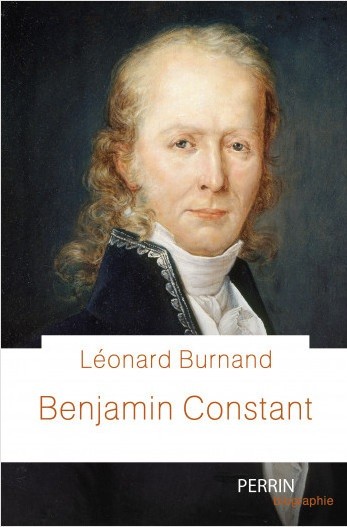History Prizes 2022
Fondation Napoléon Grand Prix 2022
 Léonard Burnand, Benjamin Constant, Éditions Perrin
Léonard Burnand, Benjamin Constant, Éditions Perrin
Benjamin Constant declared at the end of his life: “I want people to remember me by my contribution to the foundation of freedom in France.” Unfortunately, posterity did not grant him his wish. Instead, Constant is remembered primarily as the novelist of Adolphe, a pioneering masterpiece of autofiction, and his reputation of the tireless freedom fighter “in everything” (as described by Constant) has slipped away from public memory. Constant was orphaned from the moment he was born in 1767, Lausanne, into a Protestant French family. The pioneer for freedom initially led a vagabond existence throughout Europe, where he was instantly noticed for his strongmindedness and extraordinary expressiveness, as well as for his erratic love affairs and gambling debts.
In 1795, Constant became involved in politics with Germaine de Staël. Together, these two individuals were a political tour de force. Throughout his words and actions, Constant’s stance never wavered: to reduce the risk of totalitarianism through a stable, representative government that guaranteed all freedoms. Constant not only campaigned for a free press, but also for all freedoms to be granted to Black people. As a result, Constant strongly opposed the authoritarian Empire and later the reactionary Restoration.
Among his many writings and speeches, the ‘Principes de politique’ [‘Principles of Politics’] became the handbook for the liberal youth. Later on, Constant’s funeral in December 1830 generated a huge demonstration in Paris, which celebrated the freedom for which he fought. In a democratic crisis, Benjamin Constant is more relevant than ever.
Since 2012, Léonard Burnand has been at the heart of l’Institut Benjamin-Constant (the Benjamin Constant Institute). Burnand is a professor of modern history and dean of the Faculty of Arts at the University of Lausanne. His role at the institute has involved notably the publication of the Oeuvres complètes [‘Complete Works’]. He also chairs the Annales Benjamin Constant editorial board. He is well-known as the author of Necker et l’opinion publique [‘Necker and public opinion’] (2004) and his collaborative work, Germaine de Staël et Benjamin Constant. L’esprit de liberté [‘Germaine de Staël and Benjamin Constant. Spirit of freedom’] (Perrin, 2017).
Read an extract | Click here for the contents page
Fondation Napoléon 2021 Jury Prize 2022
 Sophie Muffat, Les marins de l’Empereur [The Emperor’s sailors], Éditions Soteca
Sophie Muffat, Les marins de l’Empereur [The Emperor’s sailors], Éditions Soteca
The sailors of the Consulate and the Empire were the objects of scorn in the Imperial epic. Not a sailor himself, Napoleon shook up many lives, such as those of the men whom he intended to transform into interchangeable soldiers against their will, and even that of Napoleon’s own minister.
Beyond the battles and the ships, the Navy consisted of men. Men, such as Gaspard Dot, the gunner, or Pain, the administrative officer. Sailors began their careers from a very young age, and training started on dry land. Sailors in the dockyard were either workers, builders, or engineers, whilst sailors at sea were either sailors, petty officers, ship’s officers or supernumeraries. Life as a sailor for the Empire was one of poverty, subject to maritime inscription and involved enduring cramped living quarters for months on end. A sailors’s rank would affect his level of comfort – the lower the rank, the riskier the situation. Life on board hung in the balance of the level of healthcare, management of water and rations, fighting, victory or defeat. It was then that the prisoners returned to shore, for a life on “parole” awaiting the exchange cartel or the pontoons of sinister reputation. If a sailor was lucky enough to survive injury-free, completing 300 months of military campaigns by the end of his career, he may eventually reap the reward of retirement.
The book investigates the true living conditions for sailors of the Consulate and the Empire, challenging preconceived ideas. Forgotten and misunderstood lives are thrown under the spotlight, including ministers Forfait the engineer and Decrès the admiral, builders Pierre Lair and Jean-Denis Chevillard, and engineers Fulton and Tupinier. Discover the lives of individuals such as those of the naval officers Palkène and Brasseur, Guérin (lieutenant of the Aboukir ship), the extravagant Fréminville or the sworn enemies Nelson and Villeneuve.
Sophie Muffat is a specialist in naval history from the Directoire [Directory] to the end of the First Empire. She is also a professor of modern literature, a member of the Souvenir Napoléonien, a lecturer and the author of specialist articles, notably in the journal Napoléon Ier. She is the co-author of a monograph on naval construction, le Bateau canonnier de 60 pieds modèle an XII [‘the 60-foot gunboat model year XII’]. She has also written a book in collaboration with Pascal Cyr: Desaix en Égypte, le conquérant de Bonaparte, published in 2019 by AKFG. She was awarded the ‘Médaille de l’Académie de Marine’ [‘Medal of the Marine Academy’] in 2013 and in 2022.
Read an interview (in French) with the author
published : 9 November 2022
